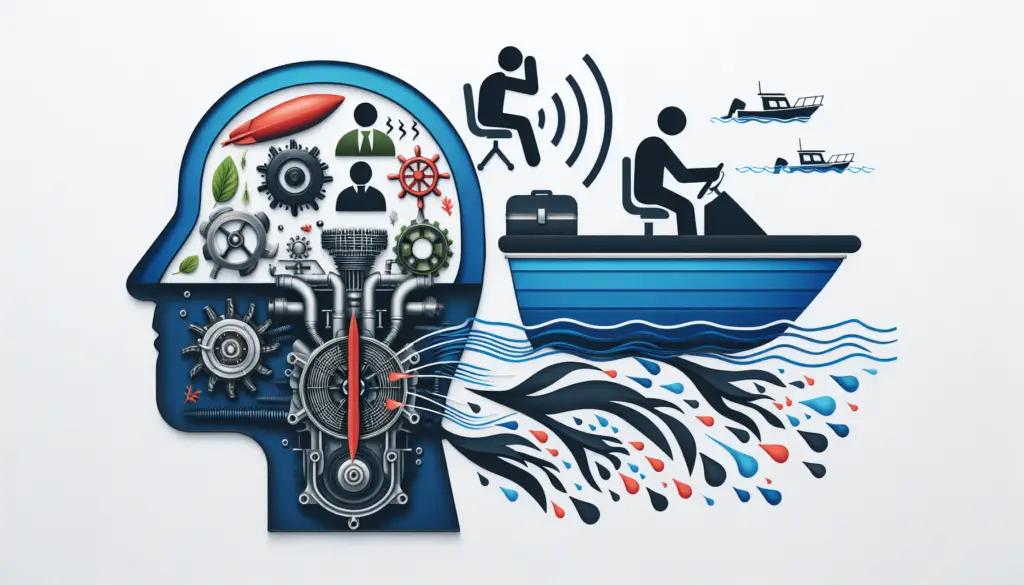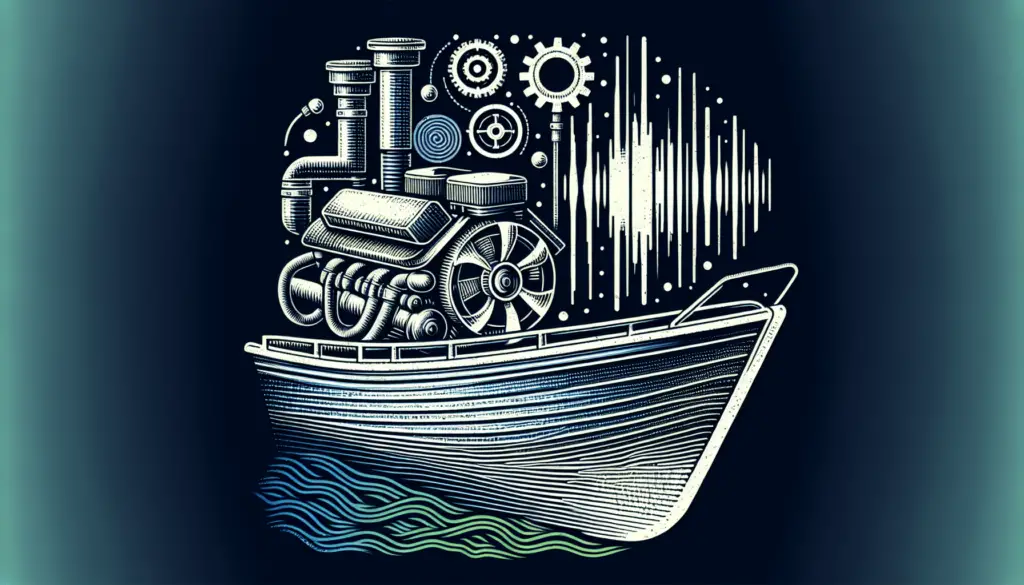Imagine you’re on an idyllic vacation, enjoying the soothing sounds of water gently lapping against a luxurious yacht. Suddenly, that tranquility is shattered by the high-decibel roar of an engine. The article “The Impact Of Boat Engine Noise On Human Health” highlights such moments of disruptive cacophony that are not only discomforting but potentially damaging to your wellbeing. It uncovers the largely ignored issue of the health risks posed by excessive boat engine noise and offers incredible insights into its damaging effects which range from irritation and stress to severe health conditions like hypertension, tinnitus, and even heart disease.

Understanding the Concept of Boat Engine Noise
Let’s dive into an issue that may affect you if you’re a boat owner or frequently find yourself on the water: boat engine noise. This term refers to the sounds produced by the engine of a boat, and it’s a lot more complex than you might first assume.
Definition of boat engine noise
At its most basic, boat engine noise is the sound an engine makes when operating. Just like the engine of a car or an airplane, the engine of a boat creates a distinctive noise that can range from a low hum to a loud roar, depending on the type and size of the engine.
Types of boat engine noises
Boat engine noises can be classified into a few different types. There are normal operational sounds, like the steady hum of a well-tuned engine, and there are also abnormal sounds that might indicate a problem, such as knocks, rattles, or excessively loud sounds.
How boat engine noise is produced
Boat engine noise is typically produced by the internal combustion process that powers the engine. In this process, fuel and air are mixed and ignited, creating a mini explosion that powers the engine. This process, occurring many times per second, produces a great deal of noise.
The Science of Sound and Noise
Understanding boat engine noise requires a bit of science, specifically, the science of sound and noise. Sound and noise are not the same, although they are often used interchangeably.
Understanding sound waves
Sound is a form of energy that travels in waves through mediums like air, water, or solids. The energy causes particles in the medium to vibrate, and these vibrations are detected by the human ear as sound.
Differentiating sound from noise
While sound is a broad term that refers to all types of audible vibrations, noise is typically used to refer to unwanted or unpleasant sound. So, while the hum of a boat engine may be a sweet melody to a seasoned sailor, to many of us, it can be considered noise.
How noise affects human perception
Noise can have a big impact on our perception of our environment. It can heighten our awareness, distract us, or cause frustration. Excessive noise, such as the sound of a poorly maintained boat engine, may even disrupt our peace and tranquility, causing physiological effects such as stress or anxiety.

Identifying Boat Engine Noise Levels
Now that we understand what boat engine noise is and how it affects us, it’s important to understand how we can identify and measure noise levels.
Measuring noise levels
Noise is usually measured in units called decibels (dB). The higher the decibel level, the louder the sound, and potentially, the greater the risk of hearing damage.
Factors influencing noise levels in boats
Noise levels on a boat can be influenced by several factors, including the design and condition of the engine, the acoustics of the boat, and the surrounding environment.
Effects of different boat engine noise levels on human ears
Different levels of boat engine noise can have varying effects on our ears. Lower decibel levels may result in a slight ringing after prolonged exposure, while very loud engine noise can lead to immediate discomfort and even temporary or permanent hearing loss.
Direct Health Effects of Boat Engine Noise
In addition to potential hearing loss, exposure to boat engine noise can have several other direct effects on our health.
Impact on auditory health
Prolonged or repeated exposure to loud boat engine noise can harm the delicate structures in our inner ear, leading to noise-induced hearing loss (NIHL).
Stress and related physiological conditions
Loud and constant noise can trigger the body’s stress response, leading to physical symptoms like increased heart rate, elevated blood pressure, and heightened levels of stress hormones.
Effects on sleep and overall rest
Noise can significantly disrupt sleep patterns, leading to poor quality sleep or sleep deprivation. This, in turn, can have a negative impact on overall health and wellbeing.
Mental health implications
Exposure to persistent noise can also lead to mental health issues such as anxiety, depression, and cognitive impairment.

Indirect Health Consequences of Boat Engine Noise
There are also indirect health implications of boat engine noise, especially when the noise becomes a source of distraction.
Potential for accidents due to distraction
Noise can disrupt focus and attention, increasing the risk of accidents on board a boat. This is particularly true if the noise is high-pitched or contains sudden changes in volume or frequency.
Impact on social interactions and relationships
Constant noise can also make communication difficult, affecting social interactions on board. This can cause frustration, misunderstandings, and strain relationships.
Effects on work or task performance
For professionals working on boats, excessive noise can disrupt focus and productivity, leading to poor work performance and task errors.
Long-term Health Effects of Exposure to Boat Engine Noise
Extended exposure to boat engine noise can have several long-term health effects.
Chronic stress and anxiety conditions
Repeated exposure to noise can lead to chronic stress and anxiety conditions, impacting overall mental health, and quality of life.
Long-term auditory damage and hearing loss
Prolonged exposure to loud noise can also cause long-term auditory damage and lead to permanent hearing loss, a condition that is irreversible and can significantly affect the quality of life.
Possible contribution to cardiovascular diseases
Recent research suggests a potential link between long-term exposure to environmental noise and certain cardiovascular diseases, including hypertension and heart disease.

Assessing Individual Sensitivity to Boat Engine Noise
Not everyone reacts to boat engine noise in the same way. Our individual sensitivity to noise can vary based on several factors.
Genetic factors and personal tolerance to noise
Some people are naturally more tolerant of noise while others are more sensitive due to genetic factors and physiological differences.
Role of age, general health condition and previous noise exposure
Older adults, people with pre-existing health conditions, and those with a history of noise-induced hearing loss may be more vulnerable to the effects of boat engine noise.
Comparing Boat Engine Noise Exposure in Different Environments
The impact of boat engine noise can vary depending on the environment in which it is experienced.
Difference between noise exposure on land and water
Noise exposure on water can be different from that on land. Sound travels differently through water, which can lead to higher noise levels and more distinct noise patterns.
Influence of environment in noise absorption and reflection
The environment can influence how noise is absorbed and reflected. For instance, open waters can reflect and amplify noise, while busy harbors can absorb and diffuse it.

Examining Boat Engine Noise Regulations
Given the potential health implications of boat engine noise, it’s important to examine the regulations that exist for noise control in this domain.
Current regulations on boat engine noise
Many countries have established regulations on boat engine noise, setting limits on the acceptable noise levels produced by different types of boats.
Effectiveness of these regulations
However, the effectiveness of these regulations often depends on how stringently they are enforced and how compliant individual boat owners are.
Penalties for non-compliance with noise control measures
Non-compliance with noise regulations can lead to penalties, including fines and even impounding of the boat in severe cases. However, these penalties often serve more as a deterrent than a solution.
Solutions for Reducing The Impact Of Boat Engine Noise On Human Health
Thankfully, there are ways to mitigate the impact of boat engine noise on human health.
Improving boat engine designs for quieter operation
Engine manufacturers can work towards designing engines that produce less noise. This can involve using newer technologies or materials in the engine’s construction.
Use of noise-cancelling technologies and devices
Noise-cancelling technologies and devices can also be used to reduce boat engine noise. This can include noise-canceling headphones for crew members or noise-damping materials for boats.
Strategies for reducing personal exposure to boat engine noise
Finally, individuals can take steps to reduce their exposure to boat engine noise. This can include limiting their time on noisy boats, wearing ear protection, and taking regular noise breaks.
There you have it. Boat engine noise can impact your health in numerous ways. Being mindful of noise levels and adopting strategies to minimize exposure can ensure that your time on the water is as relaxing and enjoyable as it should be.

